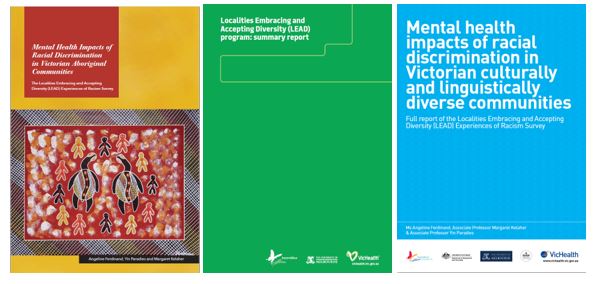Localities Embracing and Accepting Diversity (LEAD) program evaluation
-
Project Leader

Prof Margaret Kelaher
Project Details
Synopsis
Between 2009 and 2013, VicHealth’s Localities Embracing and Accepting Diversity (LEAD) pilot program pioneered a new approach to reducing race-based discrimination and supporting diversity in Australia. The program was supported by the Victorian Equal Opportunity and Human Rights Commission (VEOHRC), the Municipal Association of Victoria (MAV) and The University of Melbourne. Multiple evidence-informed strategies were implemented to engage individuals, organisations, workplaces and the broader community in two Victorian municipalities – Greater Shepparton and the City of Whittlesea. Specific activities conducted over the length of the program included:
- developing new tools and resources to support organisational change
- changing policies, procedures and communication strategies within organisations
- delivering pro-diversity and cultural awareness training programs
- holding events celebrating cultural diversity
- running social marketing campaigns
- changing media reporting practices.
The LEAD evaluation used a mixed methods approach to investigate:
- the relationship between anxiety, depression and discrimination within the two communities, using community surveys
- the strengths and limitations of a place-based approach to reducing race-based discrimination and supporting cultural diversity, using process evaluation
- the impact of LEAD in improving knowledge about how to reduce race-based discrimination and support cultural diversity, using impact evaluation.
Community surveys confirmed previous findings that there is a relationship between race-based discrimination and poorer mental health, and they highlighted the role that particular settings, such as public spaces and employment and retail outlets, have in determining the exposure to race-based discrimination. The process evaluation identified several strengths of a place-based approach, and the impact evaluation found evidence of increased pro-diversity attitudes in the councils and workplaces involved in the LEAD program.
Overall, the evaluation demonstrated how local governments can contribute to reducing discrimination and supporting cultural diversity within local communities and organisations.
Key findings
The implementation of LEAD in Greater Shepparton and the City of Whittlesea has demonstrated the feasibility of implementing a place-based initiative to reduce race-based discrimination and support diversity. Implementing a variety of strategies in multiple settings to work with individuals, organisations and the community in a specific locality has been shown to achieve substantial change. It has also highlighted some limitations of such an approach that need to be factored into any future programs, such as the time required to develop partnerships and implement action plans.
The evaluation of LEAD has added to our knowledge about how best to implement strategies to reduce race-based discrimination and support cultural diversity.
Recommendations flowing from the evaluation are that place-based approaches should consider the following:
- working with local government as a central partner
- assessing community experiences of race-based discrimination, including places where race-based
- discrimination occurs, before implementing interventions so that actions can be targeted appropriately
- assessing the numbers of suitable target organisations in each setting to ascertain the appropriateness of the place-based approach
- employing a program coordinator supported by senior management
- targeting organisations with experience in working with cultural diversity
- phasing implementation in order to harness new resources at each stage of the intervention
- maximising the level of intervention within organisations
- evaluating the results.
Resources
- LEAD summary report
- Workplace Diversity and Anti-Discrimination Assessment Tool. This tool can help you review existing policies, procedures and practices to enable your organisation to support diversity and address race-based discrimination. The original Assessment Tool that was developed and then trialed by Council’s involved in LEAD is available as a fillable PDF.
As part of the National Anti-Racism Strategy The Australian Human Rights Commission, the Diversity Council Australia and VicHealth reviewed and revised the Assessment Tool developed through the LEAD program. It is available as an online resource.
- School-Based Assessment Tool. This tool can help you review existing policies, procedures and practices to enable your organisation to support diversity and address race-based discrimination.Click here.
Researchers
- Professor Margaret Kelaher
- Angeline Ferdinand
Funding
Alongside VicHealth, co-funding was provided by the Australian Government Department of Social Services (DSS), the Lowitja Institute and beyondblue.
Research Publications
- Ferdinand, A. S., Paradies, Y., & Kelaher, M. (2017). Enhancing the use of research in health-promoting, anti-racism policy. Health Research Policy and Systems, 15(1), 61. doi:10.1186/s12961-017-0223-7
- Priest, N., Perry, R., Ferdinand, A., Kelaher, M., & Paradies, Y. (2017). Effects over time of self-reported direct and vicarious racial discrimination on depressive symptoms and loneliness among Australian school students. BMC Psychiatry, 17(1), 50. doi:10.1186/s12888-017-1216-3
- Ferdinand, A. S., Paradies, Y., & Kelaher, M. (2015). Mental health impacts of racial discrimination in Australian culturally and linguistically diverse communities: a cross-sectional survey. BMC Public Health, 15(1), 401. doi:10.1186/s12889-015-1661-1
- Priest, N., Perry, R., Paradies, Y., Ferdinand, A., & Kelaher, M. (2014). Experiences of racism, intercultural attitudes, motivated fairness and mental health among primary and secondary school students in Australia. J Youth Adolesc, 43. doi:10.1007/s10964-014-0140-9
- Ferdinand, A., Paradies, Y., & Kelaher, M. (2013). The role of effective partnerships in an Australian place-based intervention to reduce race-based discrimination. Public Health Rep, 128. doi:10.1177/00333549131286s309
Research Group
Key Contact
For further information about this research, please contact the research group leader.
Department / Centre
MDHS Research library
Explore by researcher, school, project or topic.
